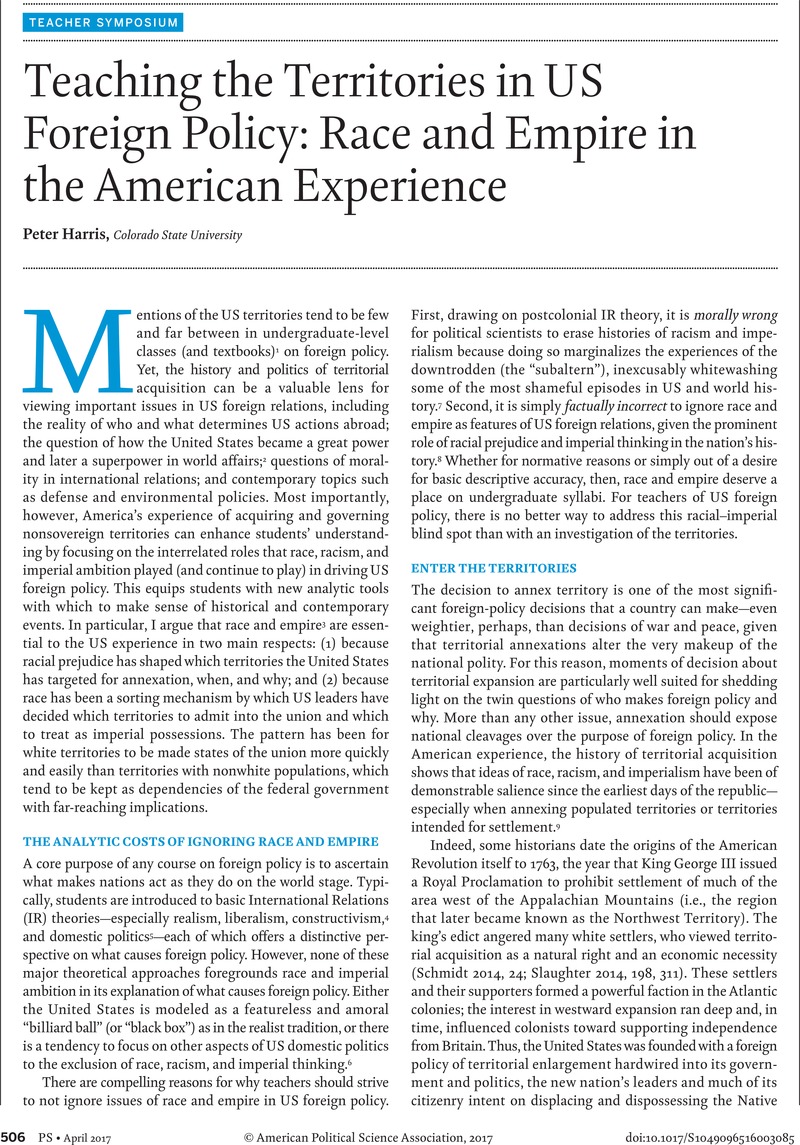No CrossRef data available.
Article contents
Teaching the Territories in US Foreign Policy: Race and Empire in the American Experience
Published online by Cambridge University Press: 31 March 2017
Abstract
An abstract is not available for this content so a preview has been provided. Please use the Get access link above for information on how to access this content.

- Type
- Symposium: “Disembodied Shades”: Teaching the Territories of the United States
- Information
- Copyright
- Copyright © American Political Science Association 2017
References
REFERENCES
Anghie, Antony. 2007. Imperialism, Sovereignty and the Making of International Law. Cambridge: Cambridge University Press.Google Scholar
Cayton, Andrew R. L. 1986. The Frontier Republic: Ideology and Politics in the Ohio Country, 1780–1825. Kent, OH: The Kent State University Press.Google Scholar
Cox, Michael and Stokes, Doug. 2012. U.S. Foreign Policy. Oxford: Oxford University Press.Google Scholar
Dudziak, Mary L. 2000. Cold War Civil Rights: Race and the Image of American Democracy. Princeton, NJ: Princeton University Press.Google Scholar
Fehrenbacher, Don E. 2001. The Slaveholding Republic: An Account of the United States Government’s Relations to Slavery. Oxford: Oxford University Press.Google Scholar
Fuchs, Lawrence H. 1990. The American Kaleidoscope: Race, Ethnicity, and the Civic Culture. Hanover, NH: University Press of New England.Google Scholar
Gruffydd Jones, Branwen. 2006. Decolonizing International Relations. Lanham, MD: Rowman & Littlefield.Google Scholar
Harris, Peter. 2014. “Environmental Protection as International Security: Conserving the Pentagon’s Bases in the Asia–Pacific.”
International Journal
69 (3): 377–93.Google Scholar
Horsman, Reginald. 1981. Race and Manifest Destiny: The Origins of American Racial Anglo-Saxonism. Cambridge, MA: Harvard University Press.Google Scholar
Ikenberry, G. John and Trubowitz, Peter L.. 2014. American Foreign Policy: Theoretical Essays. Oxford: Oxford University Press.Google Scholar
Jentleson, Bruce. 2013. American Foreign Policy: The Dynamics of Choice in the 21st Century. New York: W.W. Norton.Google Scholar
Karp, Matthew. 2016. This Vast Southern Empire: Slaveholders at the Helm of American Foreign Policy. Cambridge, MA: Harvard University Press.Google Scholar
Khalili, Laleh. 2013. Time in the Shadows: Confinement in Counterinsurgencies. Stanford, CA: Stanford University Press.Google Scholar
Krishna, Sankaran. 2001. “Race, Amnesia, and the Education of International Relations.”
Alternatives: Global, Local, Political
26 (4): 401–24.CrossRefGoogle Scholar
Ledwidge, Mark. 2012. Race and US Foreign Policy: The African-American Foreign Affairs Network. London: Routledge.CrossRefGoogle Scholar
Parmar, Inderjeet. 2016. “Racial and Imperial Thinking in International Theory and Politics: Truman, Attlee, and the Korean War.”
British Journal of Politics and International Relations
18 (2): 351–69.CrossRefGoogle Scholar
Schmidt, Ethan A. 2014. Native Americans in the American Revolution: How the War Divided, Devastated, and Transformed the Early American Indian World. Santa Barbara, CA: Praeger.CrossRefGoogle Scholar
Slaughter, Thomas P. 2014. Independence: The Tangled Roots of the American Revolution. New York: Hill and Wang.Google Scholar
Sparrow, Bartholomew H. 2006. The Insular Cases and the Emergence of American Empire. Lawrence: University Press of Kansas.Google Scholar
Trubowitz, Peter. 1998. Defining the National Interest: Conflict and Change in American Foreign Policy. Chicago: University of Chicago Press.Google Scholar
Vitalis, Robert. 2006. America’s Kingdom: Mythmaking on the Saudi Oil Frontier. Stanford, CA: Stanford University Press.CrossRefGoogle Scholar
Walt, Stephen M. 1998. “International Relations: One World, Many Theories.”
Foreign Policy
110: 29–32, 34–46.Google Scholar
Zakaria, Fareed. 1998. From Wealth to Power: The Unusual Origins of America’s World Role. Princeton, NJ: Princeton University Press.Google Scholar




